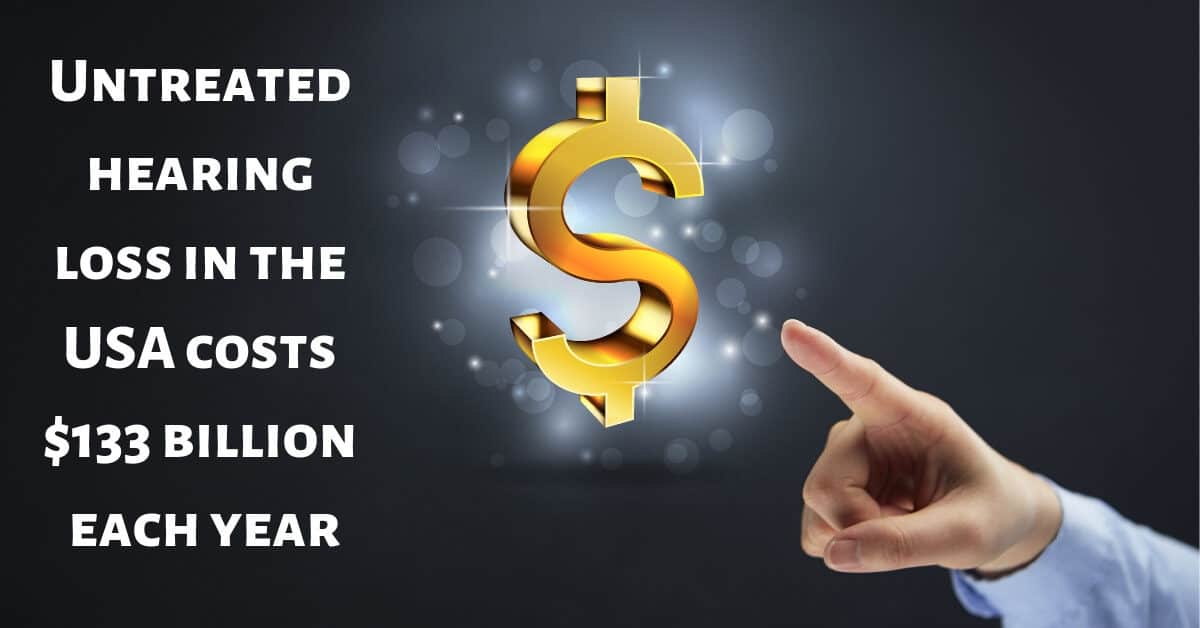- How Smoking Can Harm Your Ears - March 11, 2025
- Succeeding in the Workplace with Hearing Aids - February 10, 2025
- Welcoming the New Year with Better Hearing - January 2, 2025
The study “Hearing Loss – Numbers and Costs” was released in February 2019, revealing that disabling hearing loss in the USA costs around $133 billion each year. This equals around $9,100 per person with an untreated hearing loss. While 7% of all adults in the USA live with a disabling hearing loss, more than two out of three are not treated.
A disabling hearing loss is defined by the Global Burden of Disease research group (GBD) as a hearing loss greater than 35dB on the ear with the better ability. There are around 23 million people with a disabling hearing loss in USA. More than 14.6 million are not treated for their disabling hearing loss – only around one in three with a disabling hearing loss use hearing aids or other hearing solutions. This growth is due to an increase of a steadily aging population that lives longer, as well as earlier onset of hearing loss due to increased noise exposure.
The figures in this report are estimated using data about the number of persons with a disabling hearing loss, the use of hearing aids, unemployment, and quality of life. The majority of the costs are related to lower quality of life and higher unemployment among people with a disabling hearing loss.
The dangers of hearing loss
The report documents that the use of hearing aids and other hearing solutions improves health and increases quality of life. It also documents that people with an untreated, disabling hearing loss are at greater risk of social isolation, depression, cognitive decline and dementia, while people who treat their hearing loss do not experience a higher risk than people without hearing loss. Adults with hearing loss are less likely to take part in social activities and more likely to feel depressed or sad. People with a profound hearing loss are more likely to be unemployed, and those who are employed often make less money than people with normal hearing.
Hearing loss and mental health
Hearing loss isn’t just an ear issue; it’s a quality of life and health issue. A nationwide survey of 4,000 adults with hearing loss compiled by the National Council on Aging (Kochkin & Rogin, 2000) found significantly higher rates of psychosocial disorders including depression and anxiety in individuals with untreated hearing loss (those who were not wearing hearing aids.)
A separate study at Johns Hopkins found that cognitive diminishment was 41 percent greater in seniors with hearing loss. The study identified a link between the degree of hearing loss and the risk of developing dementia. Individuals with mild hearing loss were twice as likely to develop dementia, those with moderate hearing loss were three times as likely, and those with severe hearing loss were five times as likely to develop dementia when compared to individuals with normal hearing.
Hearing impairment and loss of income
Hearing loss can mean a lower income and higher prevalence of unemployment in people who do not use hearing aids. However, hearing aid users’ income is also almost as high as among people without hearing loss. This is shown in a study from the USA. People with untreated hearing loss lose as much as $30,000 annually, depending on their degree of hearing loss.
Hearing aids were shown to lessen the impact of income loss by 90%-100% for those with milder hearing losses and from 65%-77% for those with severe to moderate hearing loss.
Hearing Loss is Treatable
Fortunately, hearing loss is treatable. According to the Better Hearing Institute, 95 percent of Americans with hearing loss can be treated with hearing aids and individuals who treat their hearing loss early have shown significant benefit. Hearing aids help process incoming sound making it easier for your brain to understand them. “The scientific report clearly demonstrates that untreated hearing loss is a major health issue and that untreated hearing loss has a huge economic and social impact on our society. It also documents that checking your hearing and treating hearing loss pays, both for the individual and for society,” says Kim Ruberg, Secretary General of Hear-It AISBL, which published “Hearing Loss – Numbers and Costs.”
Visit Us at Blue Wave Hearing Centers
Have you experienced changes in your hearing? Treating hearing loss brings significant benefits to your overall health and well-being. At Blue Wave Hearing Centers, we provide comprehensive hearing tests and hearing aid fittings. To schedule an appointment, contact us today.


